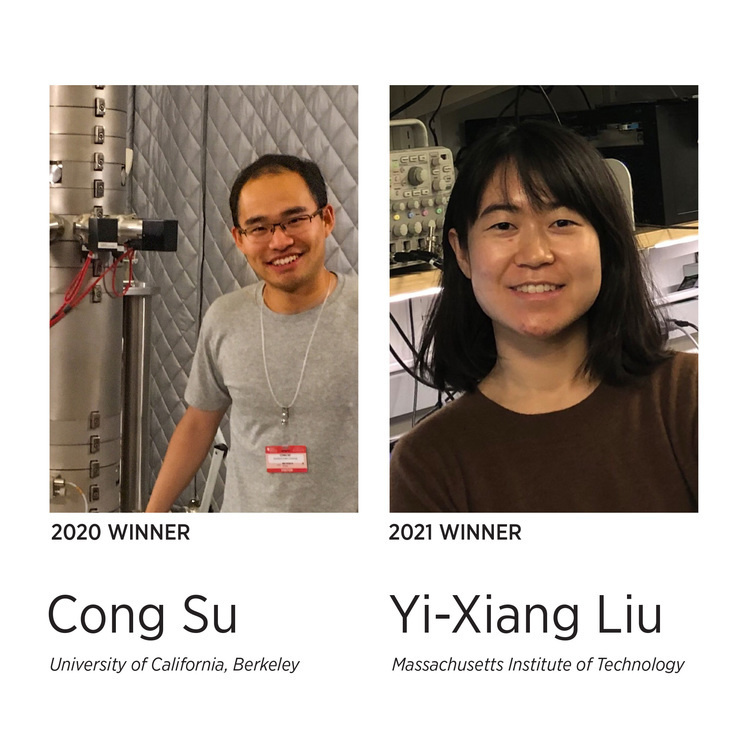
Events
2020 + 2021 Del Favero Award Lectures Dr. Cong Su + Dr. Yixiang Liu

The Del Favero Thesis Prize, established in 2014 with a generous gift from alum James Del Favero (SM ’84), is awarded to a PhD graduate in NSE whose thesis is judged to have made the most innovative advance in our field.
Please join us as 2020 award winner Dr. Cong Su and 2021 award winner Dr. Yixiang Liu present their lectures as detailed below respectively.
Dr. Cong Su - Atomic Engineering — Controlling Atoms with Electron Irradiation for Quantum Devices
ABSTRACT: Atomic Engineering (AE) — creating and synthesizing structures atom-by-atom — pushes the material design and creation process to the era of angstrom-scale after the nanoscale. The birth of AE is symbolized by the construction of the “IBM” logo using Xe atoms via scanning tunneling microscope (STM). However, since then, the STM-enabled technologies did not extend AE further to the device-level as a result of two critical issues: (1) To stabilize STM-engineered atomic structures, ultra-low temperature and ultra-high vacuum are required; (2) Atom control using STM is an extremely time-consuming process for the mass atom control due to the slow probe motion. Therefore, to release the full potential of AE, room-temperature atom-level modification method is required.
Dr. Yixiang Liu - Quantum sensing at its finest - measuring miniscule magnetic fields with nanoscale resoultion
ABSTRACT: Quantum sensing and quantum simulation are emerging areas in quantum science and technology wiht borad applications. In this thesis, we explore Hamiltonian engineering techniques to build better quantum sensors and quantum simulators.
In quantum sensing, advanced control techniques are required to extract all the information available about the sensing target from the sensor. Unfortunately, one major challenge to implementing the optimal control sequence–which extracts the maximum information–is the clock rate of the (classical) hardware used to control the sensor. To overcome this challenge, we develop a novel control technique inspired by quantum simulation (“quantum interpolation”) and achieve an effective six picoseconds sampling rate from the hardware constrained two nanoseconds. This improved sampling rate enables a higher precision in measuring classical fields and the quantum signal arising from a single nuclear spin.
To further improve quantum sensing, we engineer the sensor-target Hamiltonian and make the sensor more sensitive to the target. In particular, we address the challenge that a single sensor cannot be sensitive to all components of a vector DC magnetic field. To overcome this challenge, we modify the sensor Hamiltonian, using an ancillary oscillator, to realize a hybrid magnetometer sensitive to both the longitudinal and the transverse component of a vector DC field. We achieve a nanoscale vector magnetometer with comparable sensitivities for longitudinal and transverse magnetic field components.
Finally, we turn to digital quantum simulation, a versatile scheme to study large quantum systems’ complex dynamics via controllable quantum devices. In digital quantum simulation, the desired dynamics are approximated by a sequence of elementary gates (Trotterization). Finding a good ordering of gates to achieve high-fidelity simulation is a nontrivial task. To address this challenge, we develop a geometric picture of Trotter formulas and their errors, from which we were able to find intuitive Trotter formulas providing higher-fidelity simulation compared with the most commonly used Trotter formulas.
While the results cover a wide range of applications, this thesis’s key insight is that they all emerge from improved control techniques that engineer effective Hamiltonians starting from the natural interactions present in the original quantum system.

